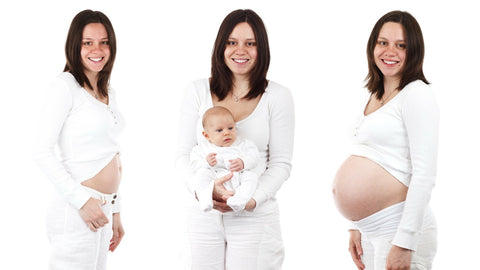
When to Start Taking Prenatal Vitamins
You should be taking folic acid, the main ingredient in all prenatal vitamins on the market, starting 1 month before you try to get pregnant. Below are some other common questions women like you have about prenatal health in the early stages of pregnancy.
What Are Prenatal Vitamins?
Prenatal vitamins are designed to support you and your growing baby’s health. They include everything to help ensure you have a happy and healthy pregnancy. During pregnancy, there is a higher need for folic acid, iron, calcium and vitamin D. These are found in higher concentrations in prenatal vitamins along with omega 3 and DHA. These vitamins are meant to supplement a healthy diet and lifestyle by providing additional support when your body and baby are growing.
Which Vitamins and Minerals are Important for Prenatal Health?
- Folic Acid helps with the development of the brain and spinal cord. Without a sufficient amount, the baby could have a neural tube defect. The neural tube is the first thing to develop at just 28 days of pregnancy. A defect here could lead to spina bifida or a baby that is unable to survive. Start taking folic acid when you are planning to get pregnant or immediately after you find out.
- Calcium helps with the development of the baby’s bones and helps you maintain yours. Calcium also plays a key role in a healthy heart, nervous system and muscles. Having enough calcium not only helps the baby to develop but also makes sure you receive your recommended daily intake. This particular calcium is easy to digest and great for pregnant and nursing moms.
- Iron helps with the prevention of anemia and supports the development and growth of the baby. Iron helps to make sure that you have enough red blood cells to carry oxygen through your body and ease fatigue associated with anemia. This particular iron supplement is vegetarian-friendly and easier to digest than some others.
- Vitamin D is helpful for the development of the bones, growth of the baby cells, and also for the immune system of mom. This vitamin affects how well your bodies absorb calcium and phosphates. Studies also show that it helps to prevent preterm labor and certain infections while pregnant.
- Omega 3 and DHA supplements have been shown in recent studies to promote brain development and health in infants and during pregnancy. There are also heart benefits for mom. Preliminary studies also suggest that it can help prevent preterm labor, preeclampsia and increase birth weights of babies. A lack of Omega 3 has also shown to increase the risk for the mother to develop postpartum depression.
What to Look for in Prenatal Vitamins?
There are many different types of multivitamins on the market geared towards prenatal health. Here is a generalized guideline to look for when choosing the right prenatal multivitamin.
- 400-800 mcg of Folic Acid
- 400 IU of Vitamin D
- 200-300 mg of Calcium
- 70 mg of Vitamin C
- 3 mg of Thiamine
- 2 mg of Riboflavin
- 20 mg of Niacin
- 6 mcg of Vitamin B12
- 10 mg of Vitamin E
- 15 mg of Zinc
- 17 mg of Iron
- 150 mcg of Iodine
- Omega 3
- DHA
Having enough of each of these for your baby can ensure that your pregnancy runs smoothly. You also need to have a healthy diet and lifestyle to support yourself during this time.

Different Types of Prenatal Multivitamins
Formulated to give you everything you and your baby need during your pregnancy; these prenatal multivitamins are among the top brands in the industry.
- Progressive Prenatal Formula - Not only a prenatal but also great for nursing and conception. This vitamin features ginger to ease nausea, cranberry to ease bladder symptoms, immune-boosting ingredients like blueberry and spinach, and everything you and your baby will need before and after birth.
- NEWC Perfect Prenatal 4 - A vegetarian-friendly vitamin with organic blueberry, blackberry, and clove to fulfill your body’s needs naturally. While maintaining a healthy diet and exercise are the most important, ensuring that you have support for your growing little one is a sigh of relief.
- Platinum EasyMulti Prenatal - With everything you need from conception to nursing, this vitamin will make sure that your body and your baby has everything it needs. With DHA for the brain, calcium for bones, and more, each ingredient was selected to make pregnancy as healthy as possible.
- NFH Prenatal SAP - Each capsule helps to ensure optimal nutrition for mom and baby to help supplement a healthy diet. It can be taken when trying to conceive, as well as during pregnancy. It will ensure that your little one gets everything they need to grow healthy.
- Thorne Research Basic Prenatal Multivitamins - Gluten-free and recommended while trying to conceive, pregnant or nursing. Lacking any of the additives in other supplements, this natural multi vitamin is scientifically designed to support your healthy diet.
- Metagenics Wellness Essentials Pregnancy - A combination of supplements to support your health from conception to nursing. Each packet contains multivitamins, calcium tablets, DHA soft gels, and choline soft gel. This wide approach will ensure that you have comprehensive support throughout your pregnancy and while breastfeeding.
- SISU Multi Expecting - With convenience in mind, these two capsules are made to compliment your healthy diet and supplement your nutrition. Making sure that you and baby are well supported during this critical phase of your lives without imposing on your normal life’s schedule.
Should I Take A Prenatal Vitamin When Trying to Get Pregnant?
Yes! Taking a prenatal vitamin will help ensure that your body has everything it needs for the months to come. By taking folic acid while trying to conceive, the baby will get everything needed to develop their brain and spinal cord before you even know you are pregnant. During the first 28 days is the time that neural tube defects can occur, which are from a lack of folic acid. By taking a prenatal vitamin while trying to conceive, it can help to prevent these defects and allow your baby to have additional vitamins and minerals during the early stage of pregnancy. Most prenatals are designed for conception up until after birth but read your label carefully.
Why Should I Take a Prenatal Vitamin During Pregnancy?
These vitamins are meant to supplement a healthy lifestyle and not replace it. Read the instructions on your bottle to see how many times a day to take your prenatal vitamins, some brands vary from 1-3 times per day. By adding these to an already healthy lifestyle, it can assist your baby’s growth. Having enough iron to prevent anemia, folic acid for the neural tube, calcium for bone growth and vitamin D for immune support develops a strong body during growth and can even help mom’s health.
Should I Take a Prenatal Vitamin After the Birth of My Baby?
Yes, continue to take your prenatal until your 6-week follow-up. Because of the changes your body has gone through and bleeding, these vitamins can ensure that you do not develop anemia and remain healthy after your baby is born. At your appointment, speak with your doctor about how you are feeling and how to continue, especially if you are breastfeeding.
Should I Take a Prenatal Vitamin While Breastfeeding?
Breastfeeding and taking prenatal is a successful combination for yourself and baby. Taking a prenatal will ensure that the vitamins and minerals are passed through the milk and help the baby to continue to grow and develop while ensuring that mom still gets everything he/she needs to heal and be strong. Most of the ingredients within the vitamins can go through the milk and to your baby for added benefits for you both. Talk with your doctor if you are breastfeeding and how long you should continue to take your prenatal vitamins and get their advice.
Do Prenatal Vitamins have Side Effects?
Many women tolerate prenatal vitamins well with no side effects. They are safe to take for conception, pregnancy and breastfeeding moms with little risk to mom or baby. However, everyone is different and some women develop the following side effects such as:
Upset Stomach
Many women complain of nausea. Not only are the hormones and baby affecting this, but it can also be caused by taking a prenatal. This can be improved by taking with food and plenty of water throughout the day.
Constipation
Women report that they feel constipated from the vitamin and their pregnancy. Stool softeners can be recommended by your doctor if this continues. Many are over the counter and are safe to take while pregnant.
Diarrhea
While some women report constipation, other report diarrhea. Each body is unique and digests differently. Talk with your doctor about what over the counter meds can be taken to help ease the symptoms. There are specific over the counter remedies along with getting enough fiber in your diet to east this.
Dark Stools
The iron in the prenatal can cause your stool to become darker. To an extent, this is a normal side effect. Report this to your doctor to monitor your iron levels and blood proteins associated with anemia.
How are Prenatal Vitamins Different from Other Multivitamins?
Prenatal vitamins are designed for pregnant women. They assist with the growth and development of a new baby and not for everyday use by non-pregnant women. Prenatal Vitamins have higher concentrations of:
- Folic Acid: Folic acid is needed to ensure healthy brain and spinal cord development in a growing baby. Neural tube defects are caused by not having enough folic acid during early pregnancy. If not pregnant, the need for folic acid is nearly half. While it is uncommon to overdose, it can lead to health deficits.
- Iron: Iron is found in higher concentrations and needed in prenatal vitamins. This has to do with the growth of the baby, the increased volume of blood and growth. When not pregnant, the need is much lower. Iron toxicity is a serious and life-threatening risk that can build up in your body from increased doses.
Common Misconceptions of Prenatal Vitamins
- They do not help your hair or nails grow. Pregnant women have additional hormones from the growing baby that make their hair and nails grow, not the prenatal vitamins.
- They will not make it easier for you to get pregnant or make you more fertile. Unfortunately, fertility is not affected by prenatal vitamins. While critical to take during conception due to the high amounts of folic acid, they will not increase your chances of getting pregnant, only support a healthy pregnancy.
What Are Some Good Organic Prenatal Vitamins?
Organic prenatal vitamins are a great supplement for vegans, gluten-free diets, and vegetarians. These will comply with all of your normal diets while providing you with the additional minerals your baby and body needs. All prenatal vitamins, including organic, should contain the same ingredients like folic acid, iron, and calcium, but can be sourced differently to meet your needs. Here are some of the top-rated vitamins:
- New Chapter Prenatal Vitamins are certified organic, vegetarian, non-GMO, gluten-free and Kosher. This vitamin is gentle on your system and features immune support as well. This vitamin has everything needed without any artificial or nonorganic ingredients.
- Garden of Life Vitamin Code: Raw Prenatal contains everything that your baby needs while growing. This vitamin is vegetarian, gluten-free, dairy-free and organic certified. With support for heart health, immune support and neural tube development.
- Natural Factors Whole Earth and Sea, Women’s Prenatal is an organic vitamin with plant-based ingredients to support you during your pregnancy. When added to a healthy diet, this supplement will assist with giving you a healthy pregnancy.
Frequently Asked Questions
How many times a day should you take a prenatal vitamin?
It depends heavily on the brand. Each has its concentration to ensure you get the recommended values, but some are spaced out over 2-3 doses. Read your bottle to see what the manufacturer says.
Can you take a prenatal when not pregnant or trying to get pregnant?
Prenatal vitamins are NOT meant for daily use by those who are not or not trying to get pregnant. They contain higher amounts of iron and folic acid needed for the development of a baby, and when not used can build up in the body. Increased amounts of iron can lead to iron toxicity which can be fatal. Increased folic acid can mask symptoms of other deficiencies and health problems.
Should I take my vitamin in the morning or evening?
Both. Many prenatal vitamins have a morning and afternoon dose to give you all the vitamins you need. If taking a once a day, many OB doctors state the morning is the best time.
Do I need a prenatal vitamin?
YES! Your body desperately needs the additional vitamins and minerals when growing a baby. During the first 3 weeks of pregnancy, without enough folic acid, your baby can develop a neural tube defect. Iron deficiencies, anemia, means your bodies cannot transport nutrients or oxygen throughout your system. Any lack of these minerals can lead to health concerns for both of you and should be remedied with a vitamin to prevent concerns.
Conclusion
We want to hear from you! What prenatal vitamin do you swear by? Which supplement helps you to feel like your best while pregnant? How did you know that you found the right prenatal vitamins? Do you use any that we recommend? Comment down below!

